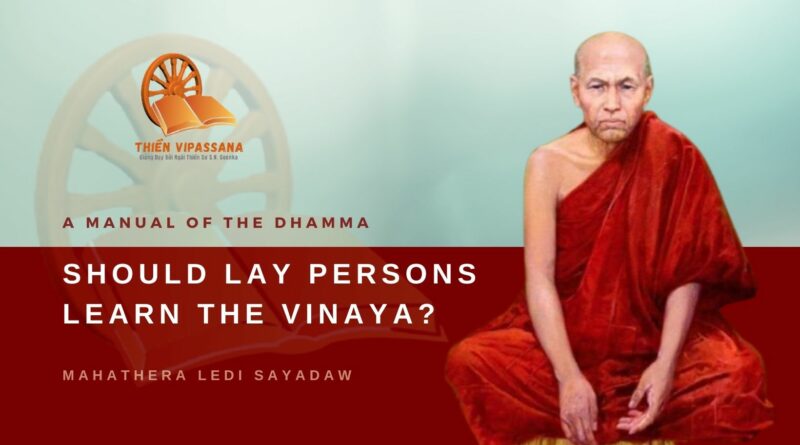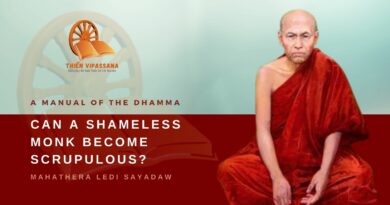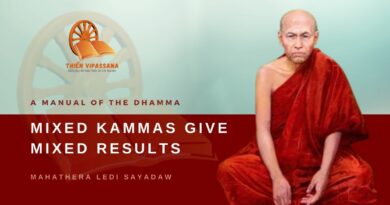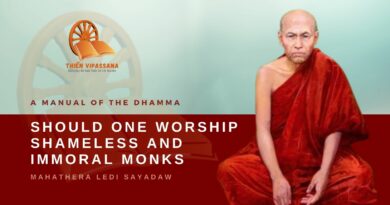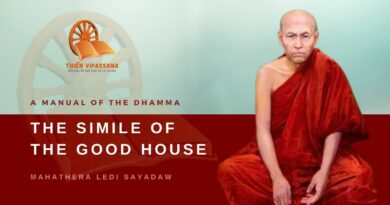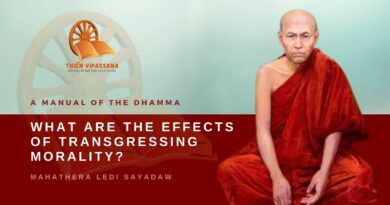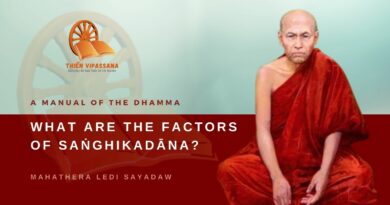Should Lay Persons Learn the Vinaya?
“Should lay persons learn the Vinaya? Does this agree with the Maṅgala Dhamma that advises one to be well-trained in discipline (vinayo ca susikkhito)? What are the good or bad results of this act? Kindly give evidence or examples to prove a definite point. Should a monk teach the monastic discipline to a lay person? What are the good or bad results of this? Please give some evidence.”
In the Maṅgala Sutta the Buddha teaches that one should be well-trained in Vinaya. The meaning of this Maṅgala Dhamma is that laity should learn a lay person’s discipline properly, that is, to learn it wisely. For laity there are disciplinary rules to learn civility and gain prosperity, such as the characteristics of a good man, the universal code of ethical conduct, the rules of a householder, etc. They should be learnt and practised wisely.
For monks, too, there are Vinaya rules to know and observe so that the factors of a scrupulous and good monk will be achieved in full. The aim of learning discipline is to make one a scrupulous, modest, and good monk. So the monks’ code of conduct is for homeless persons, but it is different from the homeless lay person’s code of conduct (Anāgārika Vinaya). Each group must follow the appropriate code of conduct. Householders must follow their rules to become moral and good, and monks must follow their Vinaya without transgressing any rule, whether partially or completely. No taint should be overlooked. This means the correct and full observance of Vinaya so that the benefits in this life and hereafter are achieved in full. Since blessings arise for monks it is called a blessing. The text does not mean that laity should learn monks’ Vinaya to obtain blessings.
The term “well-trained in discipline” is explained in the Commentary on the Maṅgala Sutta as follows: “There are two kinds of Vinaya, one for laity and the other for monks. The lay Vinaya means avoidance of the ten unwholesome kammas. A lay person shuns these ten evil kammas with a pure heart and humble attitude. With the aim of not spoiling his morality he respectfully observes the training in full. This is the meaning of the term ‘well-trained’.”
Regarding the monks’ Vinaya, the Commentary explains that a monk must observe the seven classes of rules with complete confidence. If he has no defects he gets the honour of practising well. Moreover he becomes truly learned by this means. Besides the seven classes of offences, the rules for monks include the morality of fourfold purification. By observing these four trainings a monk can reach the highest stage of sanctity, the perfect purity called Arahantship. If one diligently practises the rules to reach this noble aim, one is called “well-trained.”
So the Commentary clearly shows that a lay person must learn a lay person’s Vinaya. For monks there is the code of conduct described in the Vinaya Piṭaka. If lay people and monks both learn and practise their respective codes of conduct they are called “well-trained in discipline.” The advice in the Maṅgala Sutta does not convey the sense that laity should learn the monks’ Vinaya. The term “well-trained” does not mean mere academic study. Academic knowledge is useless in this sphere. What “well-trained” means here is that a monk diligently follows the Vinaya rules in practice. So “to be well-trained” also means “to be learned.” The main point is that without following the Vinaya rules devotedly one does not deserve to be called “learned.” Mere academic knowledge becomes useless if it is not put into practice.
The discipline for lay people is clearly mentioned in the Sutta Piṭaka. In brief, a lay person must shun ten unwholesome kammas and cultivate ten wholesome kammas. The ten unwholesome kammas are called “dasa akusala kammapathā.” The ten wholesome kammas are called “dasa kusala kammapathā.” Here the words “well-trained in discipline” encompass two factors: purification of defilements, and devoted practice of moral discipline. These two essential factors should be learned and practised by the laity.
As regards the factor of “purification of defilements” one should study the Book of Tens in the Gradual Sayings to know the practical significance in detail. The Pāḷi text in the Aṅguttaranikāya explains the four factors of defilement for breaking the first precept. “One kills by oneself. One advises, urges, or incites others to kill. One speaks in praise of killing. One consents to the act of killing.” The first two factors are obvious and need no explanation.
I will explain the factor “One speaks in praise of killing.” In Buddhism, every ethical precept and moral duty is a profound matter to know and practise with wisdom and insight. An ordinary person, seeing how riches increase for those who make their livelihood by selling meat often speaks in praise of these men becoming rich. Some may utter words in support of killing. Such praise of killing amounts to two defilements of his morality. The person breaks the non-killing precept and defilements also arise. If another person, on hearing praise spoken, follows the occupation of a fisherman or slaughter-man, one who praises their actions transgresses the precept that says “I undertake to abstain from killing living beings.” Even though he does not actually do the killing, he has expressed approval of killing, and his motive is to prompt others to kill. So, like the killer himself, the supporter is also guilty of killing.
However, mere praise without inciting others only amounts to the defilement of morality, even though another person may follow a wrong occupation or do unwholesome deeds. In this case, one who praises the act merely defiles the precept.
The fourth factor is being pleased or expressing approval when one hears about the killing of murderers, or robbers after their arrest, or if they are killed while being arrested. It also means being pleased about the killing of wild tigers, elephants, snakes, etc. Other cases include: satisfaction on hearing news about the death of one’s enemies. Longing for the destruction of bugs, cockroaches, flies, ants, rats, or other pests also means defilement of one’s precepts. Some people are pleased when animals are killed, because they are gluttonous. They willingly express support and pleasure at the killing of animals. Though this does not amount to killing, they taint themselves with approval, which spoils the moral precept.
Some people give an excuse and express enjoyment by saying that the meat and fish are for almsgiving. One should analyse each case carefully to know its true nature. One must consider the state of mind. Those who express approval of killing for almsfood or a feast should examine their motives. These grey areas need scrupulous consideration.
For ceremonies and festivals some kill the animals themselves, some take delight in it, and others praise these acts. Some monks, who want to eat good food, hope for it. So killing by indirect orders is done to satisfy the wishes of monks and guests. Butchers and fishmongers wait for this indirect sign from the servants of donors who wish to feed thousands with sufficient meat and fish.
The factors for guilt regarding the precept of not killing are listed in the Commentary. It is stated that one of the factors of guilt is “giving indirect signs, or hinting.” So in the above instances, servants of the donors either break the precept or defile it. As for the commission of evil kamma (that leads to hell) one must consider all the factors of a particular case. Some borderline cases are difficult to judge decisively.
If the servants are guilty of full transgression, donors cannot be free from evil kamma, and recipient monks and guests also cannot be free from blame. If meat is doubtful on three counts: seeing, hearing, or suspecting the act of killing, monks must not eat it. To be allowable within the Vinaya rules, meat must be free from all three factors. If a monk knows that an animal was not killed for him, he has no doubt, and so this meat is pure in all three ways. Only this type of meat and fish is allowed by the Buddha. If a monk eats meat when he is doubtful about its origin, it is a Vinaya offence. Those who offer such doubtful almsfood, receive mixed results if they mix good and bad kammas in their meritorious deeds.

